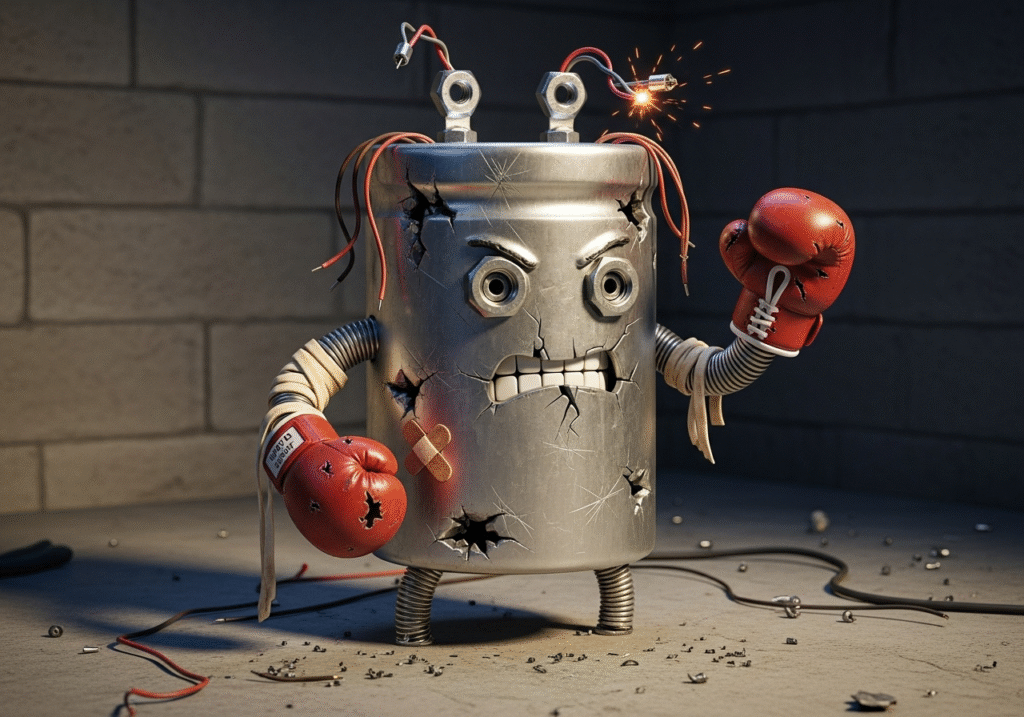Why Do HVAC Capacitors Fail So Often?
South End Plumbing Heating & Air Expert Tips

Why Do HVAC Capacitors Fail So Often?
If your air conditioner or heat pump suddenly stops working, one of the first components a technician checks is the capacitor. These small, cylindrical devices may look unimportant, but they’re essential for starting and running the motors that power your HVAC system. Unfortunately, capacitors are also one of the most common components to fail. So why do HVAC capacitors burn out so often? Let’s break down the main causes.
What Does an HVAC Capacitor Do?
A capacitor is like a temporary battery for your HVAC system. It stores electrical energy and releases it in a powerful burst to:
- Start the compressor motor
- Start the fan motor
- Help the system run smoothly and efficiently
Without a working capacitor, your system may hum, struggle to start, or stop running altogether.
Top Causes of Capacitor Failure
1. Heat Exposure
Capacitors are extremely sensitive to high temperatures. In North Carolina, outdoor units sit in direct sun and can reach 120°F+ inside the cabinet. Prolonged exposure to heat causes the internal chemicals in capacitors to dry out, shortening their lifespan.
2. Electrical Surges
Lightning strikes, power surges, and voltage fluctuations can overload a capacitor. Because they’re designed to store and release electricity, capacitors are particularly vulnerable to these spikes, which can cause them to swell or fail outright.
3. Normal Wear and Tear
Capacitors have a finite lifespan, typically around 5–10 years. Each time your HVAC system starts up, the capacitor goes through a charge-and-discharge cycle. Over millions of cycles, the internal parts wear down, just like the battery in your phone.
4. Improper Sizing or Installation
If a capacitor is the wrong size for the system, or if it was installed incorrectly, it may be forced to work harder than intended. This strain accelerates failure and can even damage other HVAC components.
5. Overheating Motors
When a motor in your HVAC system struggles due to dirt, lack of lubrication, or other issues, it demands more power from the capacitor. This extra stress can overheat the capacitor and shorten its life.
Signs Your Capacitor May Be Failing
Watch for these warning signs that your HVAC capacitor may be on its last legs:
- AC unit won’t start or takes multiple tries to kick on
- A humming noise from the outdoor unit without the fan spinning
- Blowing warm air instead of cold
- Random system shutdowns
- Bulging or leaking capacitor casing (visible during inspection)
How to Prevent Capacitor Failures
While you can’t make a capacitor last forever, you can extend its life:
- Schedule regular maintenance so motors stay clean and efficient.
- Install surge protection to guard against electrical spikes.
- Keep the unit shaded if possible, to reduce heat stress.
- Replace aging capacitors proactively before they fail completely.
Conclusion
HVAC capacitors may be small, but they’re one of the most hardworking and failure-prone components in your system. Heat, electrical surges, motor strain, and normal wear all contribute to their short lifespan. That’s why capacitor replacement is such a common repair for homeowners. With regular maintenance and surge protection, you can help your capacitor last longer—and keep your home comfortable all year long.



